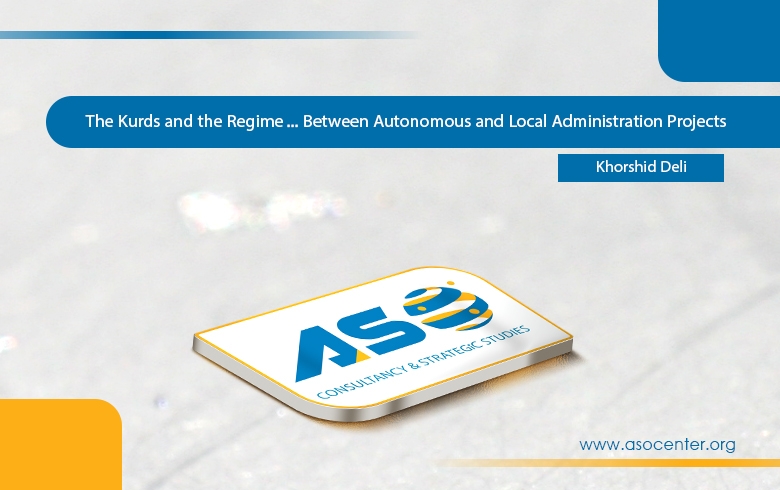

The Kurds and the Regime ... Between Autonomous and Local Administration Projects
2020-03-24
Writer: Khorshid Deli
The ongoing efforts, meetings and dialogues on the communications line between the Syrian government and the Self-Administration in east of Euphrates resulted in proposing two formats in reaching a settlement between both parties. As the Syrian government proposes the local administration law format issued in 2012, whereas the Self-Administration presents decentralization in governance and provides its experience as a model, as well as, the possibility of the generalization of this experience in rest of Syria’s regions after years of practicing it in the eastern areas of the Euphrates.
Firstly, with the assertion that each party has its motives, causes and aims in proposing its own model, as the fundamental idea that stands behind each party's presentation of its model is political. As well as, is related to the nature of the government system to be applied in the next stage. Between the experience of a central system, which has established its influence, authorities and its various institutions during the past decades and rejected other models of governance, and between the urge to move to decentralized governance for many reasons regarding the future.
Regarding impulses of transition to decentralization:
The call for decentralization in governance, automatically, guide us to search for the impulses behind this call in the form of motives reading, causes and obligations, which can be summarized in a number of basic issues. As a matter of fact, there are various studies on the reasons behind the resort to a decentralized system in administration and governance and these studies often agree on a set of reasons, perhaps the most significant of which are:
1-The necessity of organizing the relationship between the center and the regions or governorates or parties. As convening this relationship has geographical justifications that have to do with the location of the capital from the far regions and the necessity of not restricting the authorities to the center that likely turns into a bureaucratic center that hinders the development of distant regions.
2-Reasons related to the difference of identity (religious - national - sectarian - cultural). For the decentralized system, unlike the central system, provides a great amount of context for the exercise of such identity, which constitutes one of the components of the state socially, politically and historically. Moreover, in a constitutional manner to ensure that these components express their identity and their aspirations.
3- Economic and social reasons related to how to achieve development. Since decentralization provides a great deal of local participation in drawing economic plans and productive projects that suit each region and its resources. It also achieves a kind of social justice that promotes stability and limits immigration from the countryside to major cities; towards the capital Damascus in particular.
4- Political reasons related to the process of local participation in public life, distributing wealth equitably, stimulating local competencies and enhancing regional competitiveness. In a manner that all of which leads to limiting centralization that often limits power to a particular person, political party, nationality, religion or even a military institution, in a way that it entirely strengthens democracy, its practice and development of its concepts. These and other reasons have prompted many countries during the past decades to move from central to decentralized governance. Whether in its unionist, confederal, federal or even autonomous form. These models stand behind the successful governance experiences in European countries and the United States, as well as, in our region; the United Arab Emirates. Whereas, most systems of governance in the Middle East negatively perceive the decentralization of governance concept. The central government systems that were formed in this region after the era of independence, view with great passivity the decentralized system of governance, as doubt overcomes this view because they often view it as a conspiracy by America, Europe and Israel with the aim of dividing and dismantling the countries of the region.
In fact, this narrow vision of governance decentralization often has justifications related to the nature of the regimes that have formed in the region, since most of them are systems that came from military, partisan, ideological or religious backgrounds that reject diversity and pluralism. It is strange that this view or vision contradicts the extending historical experiences in the history of the region. Therefore, it should be noted that the systems of governance in the Rashidun, Abbasid and even Ottoman periods witnessed essential models of state rule that was close to the concept of federalism today. As the form of governance between the center and these states was based on two fundamental pillars: the first is loyalty to the ruler and the second is the taxation for the center authority, in exchange for broad authorities for local rulers in managing the affairs of their states and their regions at various levels. In these experiences, the matter has reached the formation of local councils for governance in each state, which are extremely similar to today’s local governments and parliaments in the states in the unionist, federal and confederate states or the autonomous states systems.
In the controversy of concepts and their implications:
In the discourse concerning efforts to reach an agreement or settlement between the Syrian government and the Self-Administration in NES, a conversation regarding two solution concepts of the aforementioned was held; the local administration law proposed by the Syrian government, where this law was issued by a Legislative Decree in 2011, known as Law No. 107, approved in 2012, and entered into force in accordance with the Articles 130 and 131 in 2014. Thus, it demonstrates a form of administrative law related to municipal administration on a service and financial basis, whereas the concept of the self-administration is broader. It has administrative, social, cultural and political aspects in the areas under the influence of this administration. Hence, perhaps the difference of concepts here, has to do with the legal and constitutional aspects, as each term has its specific connotations according to which the powers and their scope are defined and the separation aspects between its powers and other concerned authorities and institutions.
It is true that the local administration, as a concept, has an administrative and financial legal feature, however, this feature is delegated by the center or its representative in the governorate, meaning that in the end it belongs to the Supreme Council of Local Administration which consists, according to the local administration law, mainly from the Minister of Local Administration and Environment and the governor in each governorate. Not to mention, the party branch authority; the Ba’ath Party, in every governorate that is related to all local institutions in the governorate, the local administration law does not indicate the party branch secretary role. On the other hand, the concept of the self-administration is broader than that and is based on a greater degree of independence from management, plans and budgets to the political and social expression of components that have a cultural, national or religious identity.
In the overlapping points between local administration and self-administration argument, the following points can be concluded:
1- The local administration is subject to overlapping restrictions and its powers are only administrative and determined by the center in advance, while self-administration is not subject to such restrictions and it often sets its local policy and plans after it is presented to the center in the partnership framework and not only as an executive party.
2- In light of the previous idea, the authority of local administration is a delegated one and is almost limited to the administrative aspects, while self-administration authority is an acquired one. Thus, it is considered a political and administrative achievement altogether which is preserved according to the constitution and laws.
3- The center, through its concentration on the administrative field only, does not provide answers to issues of cultural and political diversity related to multiple identities, whereas self-administration presents itself as being able to express this aspect and achieve it within the framework of a civil state based on pluralism and democracy.
4- The authority of the local administration is encumbered to the center and can be undermined by the constitutionally supervising authorities, while the central administration authority is acquired and exercised in accordance with the constitution, which cannot be abolished or undermined except by amending the constitution. As a matter of fact, there are cardinal differences in terms of constitutional and legal concepts and connotations. Basically, even local administration possesses more than one concept, in terms of “is it merely a local administration or a local governance?” The same applies to the self-administration, “is it about just self-administration or self-governance?” likewise, the same applies to the pattern’s relationship of local government or self-administration with regard to the center and its authority and to what extent does it establish decentralization in governance? Is this concept of decentralization only administrative or political?
The previous questions indicate the extent of overlap and intersection in the connotations and concepts on one hand, and in the form and nature of governance on the other hand, which are questions that refer to a number of important issues regarding decentralization, perhaps the most crucial of which are:
First: determining the local form of governance and adopting it in the constitution, in order for this to become an acquired right according to the law and constitution. Thus, to create a political track that provides answers to democracy and change.
Second: defining the administrative and political tasks of local government rule or self-administration evidently. As such a matter is highly important in defining powers and authorities, as well as the legal aspects of judicial recourse in conflicts or confusion of powers.
Third: The level of decentralization, whether in local administration or self-administration, as well as, the level of proportionality between the administrative and political parties and the dimensions in organizing the relationship of the parties or governorates with the center.
Doubtless to say, these aspects, issues and overlaps between the concepts of local administration and self-administration are cardinal elements in the search for any political solution or agreement between the Syrian government and Self-Administration in NES. These issues should be approached with an open mind away from preconceived ideas and narrow view; looking forward to a pluralistic civil state that attains stability, growth and coexistence for its people. In the end, the aim is to seek a model that serves coexistence, development and advancement in a manner that achieves social justice, democracy and freedom in a country subjected to destruction due to wars and regional and international conflicts. The question here is that, with each side sticking to its proposed model of the solution, what is the outlet? Perhaps one of the options proposed is, can the local administration law be amended so that it approaches the concept of the Self-Administration? How can the Self-Administration provide a local model that achieves decentralization in governance? The answer to both questions may constitute an outlet. Perhaps it depends first and foremost on the existence of a real will and desire to reach a solution that attains the desired political change.



